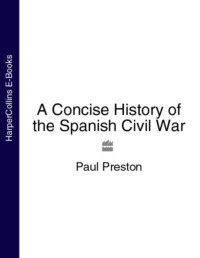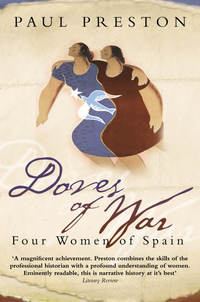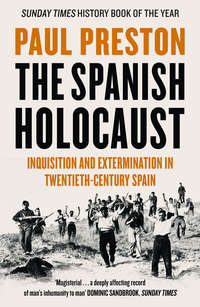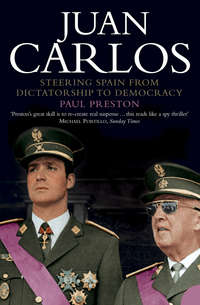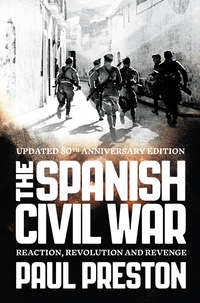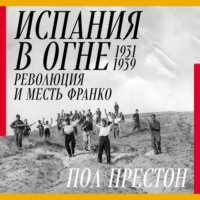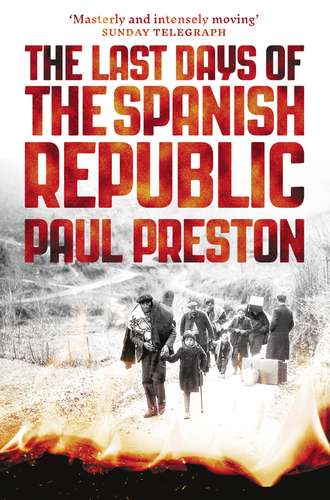
Полная версия
The Last Days of the Spanish Republic
For senior and other officers who voluntarily lay down their arms, without having been responsible for the deaths of comrades or guilty of other crimes, in addition to their lives being spared, there will be greater benevolence according to how important or effective are the services that they render to the Cause of Spain in these last moments or how insignificant and without malice has been their role in the war. Those who surrender their weapons and thereby prevent pointless sacrifices and are not guilty of murders or other serious crimes will be able to obtain a safe-conduct that will enable them to leave our territory and, in the meanwhile, enjoy total personal safety. Simply having served on the red side or having been active in political groups opposed to the National Movement will not be considered reason for criminal charges.
The message was passed from Palacios to Ricardo Bertoloty, who in turn passed it to Casado’s personal physician and close friend, Diego Medina. When Casado expressed doubts that these ‘guarantees’ really came from Franco, it was arranged that Radio Nacional would broadcast a coded message drafted by Casado himself. Not entirely convinced, Casado replied on 1 February, ‘Understood, agreed and the sooner it is broadcast the better.’ He demanded a further guarantee in the form of a letter from his friend Fernando Barrón y Ortiz, one of Franco’s most trusted generals. Casado also told Medina that it was his fervent hope ‘to end the war with a magnificent deed that would astound the world, without the loss of a single life or the firing of a single bullet’. The requested letter from Barrón would eventually reach Casado on 15 February.19
Unaware of the extent of Casado’s contacts with Burgos, on 2 February, encouraged by the clandestine organization of the Falange, Besteiro had again used his acquaintance with Ángel Pedrero to request an urgent interview with Casado. When they met at Besteiro’s house, Casado told him about his by now much more advanced plans for peace which were moving towards the idea of a coup d’état. According to reports received in Burgos from the Fifth Column, the two remained in close contact throughout February.20
An inadvertent but crucial step towards the Casado coup had been Negrín’s declaration of martial law on 23 January 1939 as Franco’s forces approached Barcelona. No previous Republican government had wished to take this step both because it would put an end to democratic liberties and because of lingering suspicion of military loyalties.21 It was a desperate, perhaps inevitable and certainly fatal initiative, aimed at forcibly uniting all forces within the centre-south zone under military authority. The decree handed power to the military – and specifically to General Miaja, chief of the centre-south army group, and to General Matallana, chief of his general staff, both of whom hoped for an early end to the war. It downgraded the authority of civil governors, handing their authority over censorship and the holding of public meetings to the military governors in each province.
According to Vicente Uribe, ‘the majority of [the military governors] were real fossils who had demonstrated their inability to command and to make war. The upshot was that a measure introduced to strengthen the fight against the enemy and reinforce discipline among civilians was used by these fossils against the Communists in particular, by putting obstacles in the way of our activities and our work.’22 It thus facilitated Casado’s conspiracy. There were many other features of the situation which encouraged Casado. After the fall of Barcelona, the Republic’s senior authorities had joined the exodus to the French frontier. Neither President Azaña nor General Vicente Rojo, chief of staff and effectively commander-in-chief of the Republican armed forces, returned to Spanish territory. Indeed, after the fall of Barcelona, the Communists had noted a change in the attitude of General Rojo. In a manuscript written as a contribution to the official Communist Party history of the war, Vicente Uribe asserted: ‘in the last days of the campaign in Catalonia, he no longer showed any confidence in the cause of the Republic nor any desire to continue the fight’.23 Negrín, on the other hand, would do both.
In the wake of the Francoist promises, Casado had lunch in Valencia with Generals Matallana, Miaja and Leopoldo Menéndez (commander of the Army of the Levante). The exact date is not known but it was probably on 2 or 3 February, certainly before Negrín returned from France. Nor is it known if it was before or after Casado’s meeting with Besteiro. In his later account, Casado claimed that he and the three generals had agreed that, in the event of Negrín returning to the central zone, they would create a National Defence Junta (Consejo Nacional de Defensa) to overthrow the Prime Minister. ‘The three generals, without argument, regarded themselves as committed to this course of action, with all its consequences.’ However, Miaja’s secretary, his nephew Lieutenant Fernando Rodríguez Miaja, who was present at the lunch at his uncle’s residence, gives a very different account. The four main protagonists were accompanied by their adjutants and there were twelve people around the table.
What became obvious during the meal was Colonel Casado’s profound discontent with Dr Negrín, against whom he let loose a stream of insults. He ate nothing and drank only milk because the gastric ulcer which exacerbated his evil temper, already bitter and disagreeable by nature, had worsened in recent weeks. Obviously, in front of that audience, even though it was quite small, he did not reveal any intention of organizing a coup against the government … The other guests also expressed their dissatisfaction with the way the war was being run but not in the extremely violent terms used by Casado.24
In Negrín’s continued absence at the French–Catalan border, Casado was increasingly indiscreet about his determination to bring an end to the war. This was revealed at a meeting held in the afternoon and evening of either 7 or 8 February at Los Llanos in Albacete, the headquarters of the air force in the centre-south zone. The property of the Marqués de Larios, Los Llanos was a country house previously used as a hunting lodge but converted into a hospital for wounded airmen. The estate surrounding the house was used as an aerodrome.25 The proceedings of this gathering can be reconstructed thanks to a memoir by José Manuel Vidal Zapater, at the time a young airman who was charged with taking the minutes. The meeting was convened by Jesús Hernández in his capacity as commissar general of the Group of Armies of the Centre and was an attempt to get the top brass in the central zone to commit to continued resistance. Among the approximately ten senior officers present were Casado, Matallana, Miaja, Colonels Domingo Moriones Larraga and Antonio Escobar Huertas (respectively commanders of the armies of Andalusia and of Extremadura), Colonel Antonio Camacho Benítez, commander of the air force in the centre-south zone, and the commander of the fleet, Admiral Buiza.
With the Army of Catalonia in the process of crossing into France, Hernández was effectively the senior civilian authority in the army (after Negrín as Minister of Defence and Prime Minister). The officers present (mainly career officers whose service pre-dated 1936) intensely resented commissars in general and Hernández in particular. The first item of business was the launch by Hernández of a dramatic manifesto to the nation, calling for last-ditch resistance and the mobilization of the remaining drafts of conscripts. His presentation was repeatedly and rudely interrupted by Casado, whose hostile reaction effectively revealed what he was up to. Rather more politely, the other officers present supported Casado’s remarks about the impossibility of continuing the war. Buiza stressed the precarious situation of the Republican navy and Colonel Camacho spoke in deeply pessimistic terms of the massive superiority of the Francoist air force, with nearly 1,500 aircraft opposed to the Republic’s barely 100 usable machines. The only officer who did not oppose Hernández was Miaja who, after a heavy lunch, gave the impression of being asleep. He woke once, pointing at Vidal Zapater and asking Matallana who he was. When Matallana replied that he was a stenographer, Miaja, being rather deaf, asked again, and Matallana shouted, ‘A stenographer!’ Miaja then returned to his siesta. Vidal Zapater suspected that this was a pantomime on Miaja’s part to save him from having to take sides openly. In contrast, Casado’s recklessness may well have been part of his efforts to secure allies within the high command.26
That Casado should have proceeded with his anti-Negrín plans after the ratification a few days later, on 9 February, of Franco’s Law of Political Responsibilities was a measure of the vehement anti-communism that he shared with the Caudillo. Retroactive to October 1934 and published on 13 February, the law aimed to ‘punish the guilt of those who contributed by acts or omissions to foment red subversion, to keep it alive for more than two years and thereby undermine the providential and historically inevitable triumph of the National Movement’. The law deemed all Republicans to be guilty of the crime of military rebellion.27 The arrogance and egoism that underlay Casado’s actions persuaded him that the law could not possibly be applied to him. Even before he got the requested letter from Barrón, on 10 February, Colonel Ungría had received a message from one of his agents which read: ‘Casado in agreement with Besteiro, he requests that the lives of decent officers be respected.’ This extremely limited, not to say selfish, request suggests that Casado and his closest collaborators believed that some sort of esprit de corps united professional officers on both sides of the lines and exempted them from Franco’s vengeful plans. It is clear that he was happy to pay for Franco’s mercy in Communist blood. As he later revealed to his contacts in the Fifth Column, Casado’s intention was to escape. At the same time, his rhetoric was about astounding the world with an historic achievement, the bloodless end to the Civil War. Presumably, he could have escaped at any time but to have done so would have covered him in shame, whereas, he believed, his plan would allow him to escape covered in glory.
Whether he realized it or not, Casado was about to sacrifice thousands of civilian lives. Even if Franco’s promises of immunity for professional soldiers were to be believed, his entire conduct of the war, his recent declarations and the publication of the Law of Political Responsibilities should have shown Casado that the surrender that he was contemplating would have bloody consequences for the Republican population. Franco had turned away from several opportunities to end the conflict quickly, preferring instead a slow war of attrition aimed at annihilating the Republic’s mass support. As his declarations to the United Press in early November 1938 had made clear, there would be no amnesty for the Republicans.
Negrín, in contrast, had long since been tortured by a sense of responsibility towards the Republican population. In July 1938, when a senior Republican figure, almost certainly Azaña, suggested that an agreement with the rebels was an inevitable necessity, he responded: ‘Make a pact? And what about the poor soldier of Medellín?’ At the time, Medellín, near Don Benito, was the furthermost point on the Extremadura front and about to fall. Since Franco demanded total surrender, Negrín knew that, at best, a mediated peace might secure the escape of several hundred, maybe some thousands, of political figures but that the army and the great majority of ordinary Republicans would be at the mercy of the Francoists, who would be pitiless.28 Knowing that Franco would not consider an armistice, Negrín refused to contemplate unconditional surrender. On 7 August, he had said to his friend Juan Simeón Vidarte: ‘I will not hand over hundreds of defenceless Spaniards who are fighting heroically for the Republic so that Franco can have the pleasure of shooting them as he has done in his own Galicia, in Andalusia, in the Basque country and all those places where the hoofs of Attila’s horse have left their mark.’29
In his determination to see the war end with the least suffering for the Republican population, Negrín was unable to rely on the support of the President Manuel Azaña. At their meeting on 30 January, he had tried to persuade Azaña that, after he had crossed into France, he should return to Madrid immediately, but Azaña refused on the grounds that to do so would constitute support for Negrín’s plans for resistance. The scale of Azaña’s panic was such that Negrín had him placed under surveillance lest he head for France without warning. When it was apparent that he could not be persuaded to stay, Negrín offered to put an aircraft at his disposal to fly to Paris, but Azaña refused for fear that he would be taken back to the centre-south zone in Spain against his will. Martínez Barrio told Álvarez del Vayo that before going into the meeting Azaña had said: ‘Negrín can tie me up, he can gag me and put me on an aeroplane. That’s the only way he’s going to get me to the centre-south zone, but as soon as I get off the plane and they remove the gag, I will scream until they either kill me or let me go.’30
In the meeting, he declared that, once he had crossed the frontier into France, he would not return under any circumstances and would devote himself only to seeking a peace treaty. Negrín was finally obliged to accept that the President could not be persuaded to return immediately. When Azaña said that he planned to go to the house of his brother-in-law, Cipriano Rivas Cherif, in Collonges-sous-Salève, Negrín told him that he must take up residence in the Spanish Embassy in Paris. Azaña agreed to go to the Embassy but insisted that he would not return to Spain. Accordingly, Negrín told Azaña that this meant he should therefore withdraw his confidence from his Prime Minister and name a substitute who could negotiate surrender with Franco. Azaña did not respond. This left Negrín with the option only of resignation. And to resign, knowing as he did what could be expected of Franco’s ‘justice’, would have seemed to him a betrayal of the Republican masses. To mitigate the damaging consequences of Azaña’s cowardice, Negrín said that the government would announce that the circumstances obliged the President to take up temporary residence in the Spanish Embassy in Paris. Azaña replied that, if such an announcement was made, he would not contradict it but that he still had no intention of returning. After the meeting, Negrín told Julio Álvarez del Vayo that he was sure that Azaña was reacting emotionally and that he would eventually see that he had to return to Spain.31 In consequence, both Negrín and Azaña would have different recollections of what had been agreed at the meeting. In a letter to his friend Ángel Ossorio y Gallardo, Azaña wrote five months later that he had told Negrín that, irrespective of any such announcement, he would not return to Spain. However, when Negrín reached Paris on 7 March 1939 after the Casado coup, he told Marcelino Pascua, the Spanish Ambassador to France, that the agreement had been for Azaña to reside in France merely provisionally until the government had re-established itself in Madrid. This accounts for the cold tone of Negrín’s subsequent telegrams to Azaña requesting his return to Spain.32
When Pascua received the news of the President’s imminent arrival, he was appalled. He thought, and told Azaña, that his presence in Paris would cause immense damage to the Republic, effectively announcing to the British and French authorities that he considered the war lost and thereby undermining the basis of Negrín’s policy of using the rhetoric of resistance as a negotiating card. Pascua was soon irritated by what he described as Azaña’s carefree routine of ‘la dolce far niente’. It consisted largely of a daily touristic excursion around Paris in an Embassy car accompanied by his inseparable friend and brother-in-law Cipriano Rivas Cherif followed by an evening gathering (tertulia) with his friends in the French capital. Resentful of what they believed to be a betrayal of the Republic, the domestic staff of the Paris Embassy even refused to serve him.33 In fact, Azaña was more concerned with the preservation of the artistic treasures of the Prado than with the impact of his decision to flee. He had said to Álvarez del Vayo: ‘A hundred years from now, few people will know who Franco or I were but everyone will always know who Velázquez and Goya are.’34 He was also concerned to go on collecting his salary.35
The tensions deriving from Azaña’s presence in Paris were exacerbated by the closeness of his relationship with Cipriano Rivas Cherif. Rivas Cherif was regarded as a frivolous lightweight by Pascua, by Álvarez del Vayo and by Negrín. He had made damaging mistakes as Consul in Geneva and, merely to please Azaña, he had been given the virtually meaningless title of Introductor de Embajadores, effectively head of protocol for the President. However, in Paris, he was Azaña’s liaison with the Quai d’Orsay and behaved as if he was at the service of the French government rather than the Spanish Republic. To the French Foreign Minister Georges Bonnet he parroted Azaña’s view that the Republic was finished and that the rhetoric of resistance by Negrín and Álvarez del Vayo was merely a device to gain time. His conversations with Bonnet convinced the French that the Spanish government was adrift and in conflict with the exiled head of state who, unlike Negrín and Del Vayo, had the good sense to see that the only answer was an immediate peace settlement.36
Negrín knew that the war was effectively lost, but he was not prepared simply to walk away. As he told the standing committee of the Cortes on 31 March 1939: ‘The Government, in the first few days after reaching Figueras, after leaving Barcelona, realized that we were facing a real catastrophe, a catastrophe infinitely bigger than the catastrophe that we have suffered with the retreat of the civilian population and the army. It was fully aware that there was very little chance of saving the situation, but the Government knew that it was its duty to look for a way, if there was one.’37 When Negrín said ‘the Government’, he was referring to himself.
On the morning of Sunday 5 February, Azaña achieved the exile he had longed for. He described the pathetic manner of his entry into France some months later in a letter to his friend Ángel Ossorio y Gallardo. He and his entourage left at dawn in a small convoy of police cars. As a courtesy, Negrín accompanied them across the frontier. The President of the Cortes, Diego Martínez Barrio, travelled ahead in a separate car. This vehicle broke down. Negrín and others in the party tried unsuccessfully to push it out of the way. The party was obliged to cross the hazardously icy border on foot, thereby fulfilling a gloomy prophecy made by Azaña at the beginning of the Civil War. He had said to his wife, Dolores Rivas Cherif: ‘We will end up leaving Spain on foot.’38 When taking his leave, before walking back into Spain, Negrín kissed the hand of Dolores Rivas and said: ‘Until we meet again soon in Madrid.’39
As Julián Zugazagoitia commented, Negrín and Azaña were incompatible, the one energetic, dynamic and fearless; the other sedentary and timorous. By this stage ‘They felt mutual contempt. At that moment, they hated each other.’ On his return to Spain, Negrín remarked to Zugazagoitia: ‘You have to feel sorry for poor Azaña! He is fearfulness incarnate. His fear gives him a greenish-yellow colour and makes him look like a decomposing corpse.’ As he was approaching the frontier, Negrín encountered Lluís Companys, the Catalan President, José Antonio Aguire, the Basque President, and Manuel Irujo, who had been Minister of Justice in his own government. They had proposed accompanying Azaña into France, but he had refused their offer because to have crossed together would have implied that they were on the same level. They now offered to go back into Spain with Negrín, but he politely declined, allegedly muttering to himself, ‘That’s one less thing to worry about.’40
The cabinet had been installed in the castle of Figueras on a hill overlooking the town. With a drawbridge, thick outer and inner walls, it seemed impregnable but was an entirely inappropriate location for a government. According to the British Chargé d’Affaires, Ralph Stevenson, it was:
a large fortress-like barracks on the outskirts of the town. At the best of times, it must have been an uncomfortable place, cold, dank and dirty. But with the débris of the Spanish Government heaped into it pell-mell it was an unforgettable sight. Luckily the weather was bad and there was no great likelihood of aerial bombardment for the place was a veritable death-trap, with only one narrow road, serving for both ingress and egress, along certain stretches of which only one vehicle could pass at a time.41
When the weather permitted, the town was subject to frequent rebel bombing raids. Around the courtyard, various ministries were installed in rooms with the words ‘foreign ministry’, ‘ministry of the interior’, ‘cabinet office’ and so on roughly chalked on the wall next to the door. The town square, where the office of press and propaganda had been installed in a requisitioned house, was heaving with refugees. There was little by way of furniture and even less food for the staff. In the words of Herbert Matthews, ‘It was a madhouse of bewildered officials and soldiers, struggling desperately, not only with their own work, but with those thousands of swarming refugees who filled every house and doorway and covered almost every inch of the streets where men, women and children slept through the bitterly cold nights with almost no food and certainly no place to go.’42 Negrín worked ceaselessly to try to limit the catastrophic humanitarian consequences of the defeat in Catalonia and to keep alive the idea of resistance as the best way to achieve a peace settlement that would prevent a vengeful mass slaughter at the hands of the Francoists. To this end, he maintained ‘the mask of resistance come what may’. With a colossal weight on his shoulders, he tried to conceal his exhaustion and despair from his ministerial colleagues. Zugazagoitia related that ‘one evening, he appeared in the castle, exhausted, almost unable to breathe. He asked if we had anything to eat, sat down at the table and, on the verge of tears, was plunged into a crisis of melancholy.’43
Negrín spoke to the last meeting of the Republican Cortes held in the stables of the castle at midnight on 1 February. It was so cold that many of the deputies sat in overcoats. According to the correspondent of the London Daily Herald who was present:
Empty chairs were stacked along the walls. Over 106 failed to answer the toll call: many of them were in France, others were holding the dispirited troops together, others had already fallen into Franco’s hands. Four times during the session the unshaded swaying lights registered the bombardment which was hitting the town. Negrín, immaculate in a brown suit, was so calm he might have been addressing his students in the quiet prewar days of Madrid.
In his exhaustion, he had to pause frequently to gather breath.44
In the dark, echoing stone chamber, the proceedings appeared to Zugazagoitia like ‘an intimate religious ceremony celebrated by a persecuted sect’. Negrín was, in many senses, virtually alone, deserted by many, supported by a small group of faithful friends. Yet he assumed the responsibility of fighting on, of doing the best for the Republican population that faced defeat and the ‘mercy’ of Franco. Bone-tired, he delivered his speech with what Zugazagoitia termed ‘unutterable anguish’. The main burden of his words was the need for international mediation to secure guarantees that there would be no reprisals at the end of the war. He presented a plan to bring the war to an end in return for Franco observing certain conditions, the principal one being that there should be no bloodbath. He suggested that the exodus of 450,000 refugees after the fall of Barcelona constituted a plebiscite against the Francoist invaders.45 The assembled deputies gave Negrín a unanimous vote of confidence, although, as they left, there were embittered mutterings against the Communists. All the deputies went into France, some to seek ways of returning to the central zone, others to stay and secure their own safety. Among those who stayed in France, especially the anarchists and the Socialist supporters of Largo Caballero, there were absurd accusations that Negrín and the Communists were responsible for the defeat of the Republic. As Zugazagoitia commented, they reflected a desire to avoid recognizing the real causes of Republican defeat.46


